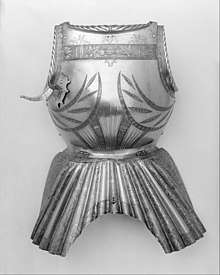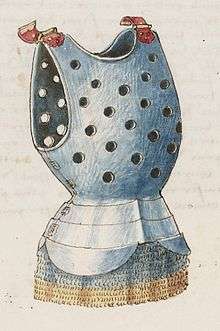Lance rest
A lance rest (also known as an arrêt de cuirasse or, more simply, an arrêt) is a metal flange that is typically attached to the right side of a breastplate, just under the armpit. The lance rest appeared in the late 14th century, remaining in use until plate armor in general became disused.[1]

The usage of a lance rest can be more readily gleaned by looking at the French term "arrêt", or "arrest". The lance rest was not used to simply hold the weight of the lance, as the English name might suggest, but to arrest the rearward movement of the weapon.[1] This would allow the wielder of the lance to couch the weapon more securely, thus delivering a more solid blow to his target while lessening the chance of injury to himself. The lance rest achieves this by spreading the impact of a blow through the breastplate to the torso of the wearer, thus redirecting the force of the blow away from the hand, wrist, elbow, and shoulder.[1] A ring of leather around the handle of the lance, placed behind the hand but before the armpit or lance rest and typically known as a grapper[2] or arrêt de lance, is used to further secure the lance in its couched position. When used in conjunction, the lance rest and grapper are able to stabilize the lance considerably when it is in its couched position.[2]
The lance rest is typically bolted[3] to the side of the breastplate or secured through the use of metal tabs known as staples.[4] The majority of the time, the lance rest is hinged so that it can be folded upward to prevent an obstruction of the wearer's sword arm once the lance has been abandoned in favor of a sword.[1]
References
- "Arms and Armor—Common Misconceptions and Frequently Asked Questions | Thematic Essay | Heilbrunn Timeline of Art History | The Metropolitan Museum of Art". Metmuseum.org. Retrieved 2011-03-14.
- "Mounted Combat: Weapons". Classicalfencing.com. 2006-03-26. Retrieved 2011-03-14.
- "Encyclopedia of historical weapons - Lance rest". Armouronline.com. Retrieved 2011-03-14.
- "Milanese Pauldron and Lance Rest". Age of Armour. Retrieved 2011-03-14.
